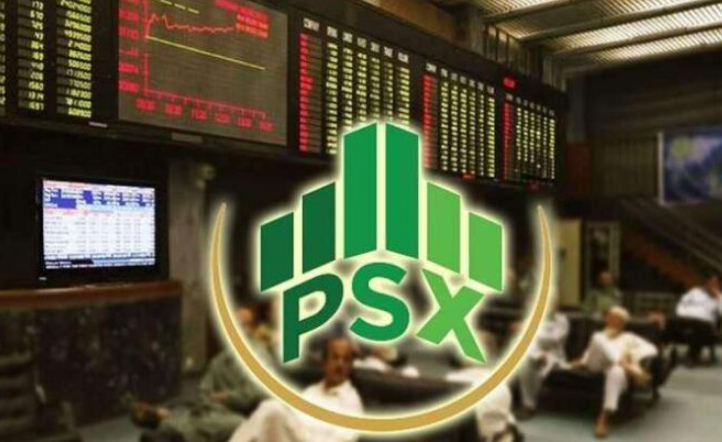Karachi (Web Desk): The Pakistan Stock Exchange (PSX) experienced a significant downturn on Monday, as the 100-Index dropped by 3,882.17 points, marking a 3.27% decline.
The index ended the day at 114,909.49 points, a sharp contrast to the previous session's close of 118,791.66 points.
The trading volume for the day surged to 710.79 million shares, compared to 553.67 million shares the day before, with the total value of shares traded reaching Rs 43.02 billion, up from Rs 35.49 billion.
The day saw 450 companies participating in the market, of which 52 recorded gains, 357 suffered losses, and 41 saw no change in their share prices.
Leading the market in terms of trading volume were WorldCall Telecom, Cnergyico PK, and Bank of Punjab, all of which saw substantial activity.
Among the companies showing significant price movements, Philip Morris Pakistan led the pack with the highest increase, gaining Rs98.20 per share to close at Rs1,080.18.
On the other hand, Bata Pakistan experienced the steepest drop, shedding Rs157.05 per share to end at Rs1,528.76. The market was also marked by sharp declines in major indices worldwide, reflecting the broader risk-off sentiment.
Globally, Asian stock markets saw substantial losses, with Japan’s Nikkei index plunging by 6%, reaching levels not seen since late 2023.
South Korea also saw a sharp 5% decline, while the MSCI Asia-Pacific index, excluding Japan, fell by 3.6%.
Chinese blue-chip stocks lost 4.4%, and Taiwan’s index, which had been closed for two days, tumbled nearly 10%. Concerns about rising tariffs and economic slowdowns were the primary drivers behind the sell-offs, as markets awaited potential government responses, particularly from China and Taiwan.
In Saudi Arabia, the stock market opened on Sunday with a steep drop of 6.78%, marking its worst daily loss since the early days of the COVID-19 pandemic.
Meanwhile, India’s stock market also faced a heavy sell-off, with the Nifty 50 index down by more than 3%, and the Nifty IT sector—dominated by technology companies with significant exposure to the US market—suffering a loss of 5.53%. The Indian market’s reaction was partly attributed to the US administration’s decision to impose a 26% tariff on imports from India.
Last week, US President Donald Trump set off a significant market downturn after announcing a series of new tariffs against his country's trading partners.
He argued that these tariffs were necessary to address unfair trade practices that had been taking place for years, suggesting that other nations had been taking advantage of the US in deals.
The US president also claimed that many countries were eager to negotiate better agreements with Washington, framing the move as a long-overdue correction.
This announcement triggered uncertainty in the markets, as such policies often signal potential disruptions to global trade and economic stability.


